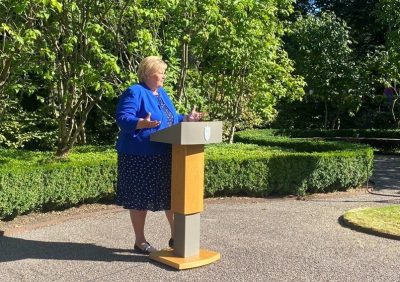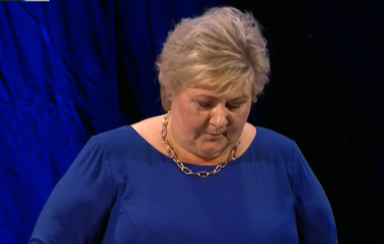Prime Minister Erna Solberg isn’t about to let the defeat of her Conservative Party in Monday’s election spoil her political plans or career. She formally “advised” King Harald V on Tuesday to contact Labour Party leader Jonas Gahr Støre and ask him to form a new government, while she intends to remain leader of her party and lead the opposition in Parliament.

“The party has put fantastic confidence in me for 18 years,” Solberg told reporters at a post-election press conference on Tuesday. “They’re the ones who decide who leads from now on. I’m motivated to keep going.”
Solberg was customarily calm and keen to carry on after losing her attempt at a third term in office. Election analysts had warned in advance that no matter how popular or competent a leader may be, voters often seek change after two terms with the same prime minister.
“The Conservatives’ biggest opponent is its eight years in government,” Johan Giertsen, who leads the public opinion poll network Poll of Polls, told newspaper Dagens Næringsliv (DN) just before the election. “It’s the same thing (Jens) Stoltenberg experienced in 2013. The re-election campaigns then and now have many similarities.”
Others agree, even within the Solberg’s party. “Erna has steered the country safely through the refugee crisis, the oil price crisis and the Corona crisis and she’s well-liked,” one of the party’s campaign officials who didn’t want to be identified told DN. “Our numbers show how we ‘own’ the biggest issues like jobs for everyone, good schools and we’re strong within health care, but we still never got the wind in our sails. We don’t understand it.”
Sheer government fatigue among voters is often the reason. Solberg and her ministers have arguably also been the most visible on a constant basis recently, as they’ve held one press conference after another during the Corona crisis. It all ended with Solberg’s Conservatives winning just 20.4 percent of the vote, down 4.6 points since the last parliamentary election in 2017. Solberg herself noted that the size of the setback was exactly the same as what the last Labour government suffered after its second term.

“It’s a bit sad,” Solberg told state broadcaster NRK after Tuesday’s press meeting in the garden of the prime minister’s residence. She and her husband Sindre, originally from the Bergen area, will soon need to move out of it, “but we know that in a month or so, it will be time to pass the baton for leading the country to Jonas Gahr Støre.” She said she looks back on her eight years as prime minister with pride, thanked all her party and government colleagues and wished Støre good luck.
She’ll return to her longtime seat in parliament, where she promises to be a “constructive” leader of the opposition. She’ll also continue as leader of the Conservatives. That was confirmed by other party leaders including Fabian Stang, the Conservatives’ former mayor of Oslo. “Erna will sit (as leader) as long as she wants,” he told DN. Solberg, now age 60, says she wants to continue as party leader given the new political situation, “but we have lots of great talent in the party. At some point a generation shift will occur, but it’s the party itself that will make that evaluation.”
Solberg thinks Jonas Gahr Støre will be a good prime minister and said she’s urged him to “just be himself.” The job is so all-encompassing, she said, “that if you try to build an image, and do or try to be something you aren’t, it can be difficult.”
Formal royal procedures for the transition
There’s both protocol and specific formal procedures in place when governments change in Norway. The monarch always asks the sitting government to continue in a caretaker role until a new government is formed. After “advising” King Harald about who he could contact to do that, he then formally asks that person (in this case Støre) to form a new government.
Støre can then, at the request of the monarch, gather the leaders of the parties that make up the new government alternative for a meeting. After negotiations that may extend for several weeks, the parties must either agree on a new platform or agree to disagree. If they agree to govern together, they inform the monarch who then formally appoints all government ministers at a special session of the Council of State at the Royal Palace in Oslo, after which the ministers head for their new offices for the first time and get to work.
Støre told reporters on Tuesday that Labour’s negotiations with the Center Party and the Socialist Left Party (SV) are likely to begin next week if not before. They’ll aim to be completed, with a platform in place, just after Parliament opens in early October, but it will still be Solberg’s government that will present a state budget for next year right after that. The new government can make some adjustments in the budget, but normally doesn’t have time to present a new budget of its own until the next year.
newsinenglish.no/Nina Berglund

